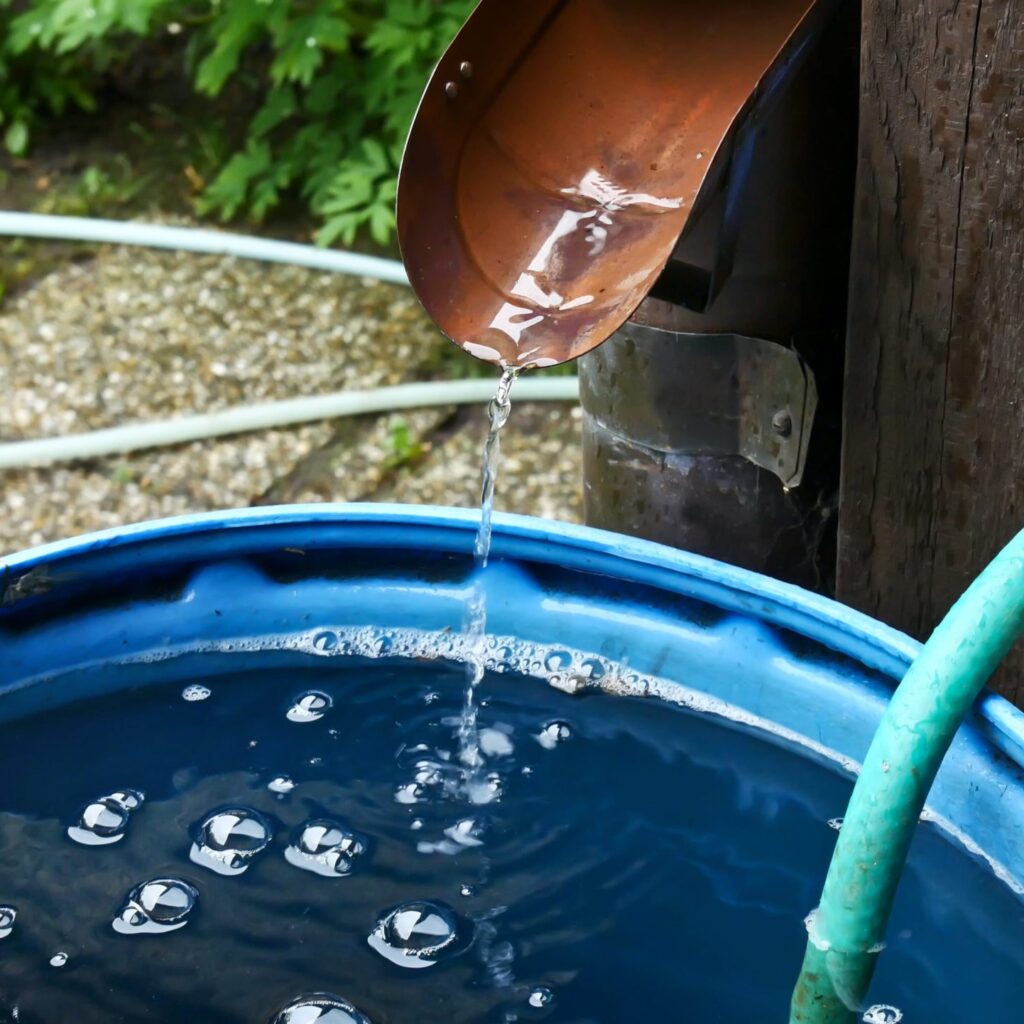Runoff and Rain Barrels
In the days before highways, parking lots and commercial developments, the natural processes of rain water were managed by streams and forests. However, since humans began living in concentrated areas, changes to the natural environment have turned rain water into a force to be reckoned with.
Water that flows off rooftops, driveways, parking lots and other hard surfaces when it rains or snows is called stormwater runoff. Because impervious surfaces do not allow rain to infiltrate into the ground, the volume of stormwater runoff is generally greater than in natural areas.
Without management, this runoff can cause a number of problems, including erosion and flooding. In order to prevent these issues, stormwater runoff is managed through storm drains, catch basins, ditches and culverts that direct the water to local streams, lakes and rivers.
Unfortunately, most stormwater runoff is not cleaned before it is diverted to area waterways. For instance, in Hamilton County, there are only a few areas of North Chattanooga and downtown that send stormwater to water treatment plants before diverting it to area streams and the Tennessee River.
“In most parts of Hamilton County, stormwater runoff is not treated and goes directly into a receiving stream; therefore, it takes with it whatever it picks up,” says Tim McDonald, manager for the Hamilton County Storm Water Pollution Control Program.


Stormwater can contain a variety of pollutants, including:
- Oil, grease and toxic chemicals from motor vehicles
- Pesticides and fertilizer runoff from lawns and gardens
- Phosphates from soaps
- Trash
- Sediment
- Viruses, bacteria and nutrients from pet waste and failing septic systems
- Road salts and sand
- Heavy metals from roof shingles, motor vehicles and other sources
- Thermal pollution from dark impervious surfaces such as streets and rooftops
The term for this type of pollution is “nonpoint source pollution,” which means the sources of the pollution are not easy to define – or resolve. In other words, one business or individual is not solely responsible for the pollution, it is a collective byproduct of urban living that everyone is responsible for.
The impact of polluted stormwater runoff is significant. The Environmental Protection Agency estimates that nonpoint source pollution is the single biggest factor affecting water quality today. The Tennessee Department of Environment and Conservation (TDEC) estimates that 30 percent of the state’s streams are of such poor water quality that they cannot support a healthy population of fish and other aquatic life, and almost 40 percent are not fit for human recreation.
The good news is that there are forward-thinking businesses, governmental agencies and individuals who are beginning to develop and utilize integrated water management (IWM) techniques to responsibly deal with stormwater issues and reduce water use, improve the health of local waterways, and save money. One such technique is the use of rain barrels. A rain barrel is a system that collects and stores rain water from a roof, capturing stormwater runoff. The water collected can be used to water yards and wash cars and windows.
A rain barrel can save a homeowner about 1,300 gallons of water during peak summer months.
Relatively simple and inexpensive to construct, a typical household rain barrel is made up of a 55-gallon drum (plastic or wood), a vinyl hose, PVC couplings, and a screen grate to keep debris and insects out.
The barrel connects to a downspout on a house or building in order to collect rain water right off the roof.
“Rain barrels benefit the homeowner because the runoff can be used for irrigation and landscaping,” McDonald says. “They benefit waterways because they help reduce nonpoint source pollution by collecting and reusing water at the site where it is generated.”
Rock City Gardens had success using two 70-gallon rain barrels last summer for collection and irrigation, says Jeff Raabe, director of operations for the Chattanooga attraction.
“The facilities at Rock City have expansive roofs that produce a lot of water runoff, which could be a problem if not managed correctly,” Raabe says, adding that 60 to 70 percent of water use at Rock City Gardens is used for irrigation. “We were really pleased with the testing, so we are going to get several more rain barrels for next spring. We think, ultimately, our water harvesting plan will be a mix of products, including rain barrels and water runoff ponds.”
The Chattanooga Coca-Cola Bottling Company is also a champion for rain barrels. As part of The Coca-Cola Company’s global commitment to expand support of healthy watersheds and sustainable community water partnerships, they have partnered with the World Wildlife Fund to conserve seven freshwater basins around the world – including the Tennessee River.
“We have a unique opportunity to take an active role in educating our community and then provide a way for individuals to save money while preserving and protecting our environment,” says Rick Hansard, director of marketing for The Chattanooga Coca-Cola Bottling Company.
Clean water begins at home – everyone has something to contribute when it comes to ending water pollution and creating healthy waterways. If each individual and household took steps to harvest stormwater runoff and conserve water, the impact on the health of the community would be far-reaching.
“Citizens and consumers need to stay informed about stormwater as a whole because they can make a difference,” McDonald says. “Collectively, we can make a big difference.”
For more information about rain barrel programs in the area, contact the Hamilton County Storm Water Pollution Control Program at (423) 209-7851.

